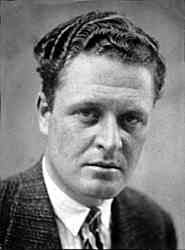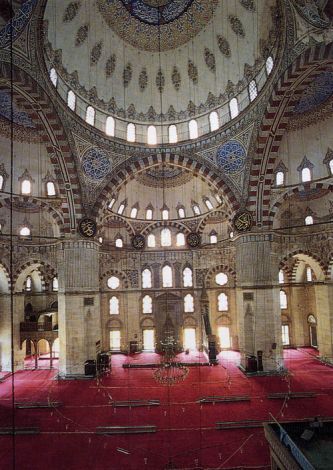NAZIM HIKMET

My favorite Turkish writer is everyone’s favorite, Nazım Hikmet. By universal agreement he is the greatest literary figure the Turkish Republic has produced. Poet, playwright and novelist, extravagantly gifted and fervently patriotic, he was also a Communist who spent much of his life in jail and died in exile in 1963 after having been stripped of his Turkish citizenship. Every Turk knows his name, but to this day his work may not be taught in public schools. His life and literary creations exemplify Turkey’s glories and frustrations, its audacious beauty and its paralyzing fears.
Nazım – his admirers always call him by his first name – was born in 1902 in Salonika, the same city where Ataturk had been born twenty years earlier. Unlike Ataturk he came from a well-to-do family, but like the Great Man he decided as a youth that he could best serve his country by making a career in the military. When his illness forced him to leave the naval academy, he chose to follow his other passion, poetry. On a trek across Anatolia in his late teens he met several Turkish Communists. Impressed with their idealism and fascinated by the promise of bolshevism, a conviction that deepened after he visited Moscow in 1922, he joined the Communist party. He saw no contradiction between his love of Turkey and his Marxist convictions, but the authorities did. His talent proved no defense against persecution, and he spent the rest of his life in trouble with the law.
Turkey shared a border with the Soviet Union, and for years Soviet leaders plotted to bring it into their sphere of influence or even to seize it and incorporate it into their empire. In this climate it was too much to hope that at Turkish poet could get away with writing rhapsodic elegies to Marxism and bitter condemnations of oppression in Turkey. Nazim was in and out of prison on a variety of charges, but at the same time he flowered as a poet. His style was as revolutionary as his politics. Until he picked up a pen, Turkish poetry had for centuries been heavily stylized and effete. He was the first writer to produce poetry in conversational, colloquial Turkish, and although his books were banned for years, he was the first to touch the hearts of ordinary Turks, In his approach to literature and life he was comparable to Walt Whitman, a poet of the common man who scorned conventional patriotism but still insisted that he loved his country beyond all reason. The heroes in his poems, he once wrote, were not “generals, sultans, distinguished scientists or artists, beauty queens, murderers of billionaires; they were workers, peasants and craftsmen, people whose fame had not spread beyond their factories, workshops, villages or neighborhoods.”
At another time he explained his ambition this way: “I want to write poems that both talk only about me and address just one other person and call out to millions, I want to write poems that talk of a single apple, of the plowed earth, of the psyche of someone getting out of prison, of the struggle of the masses for a better life, of one man’s heartbreaks, I want to write about fearing and fearing death.”
The works Nazim produced in the 1930s have lost none other freshness. Today they speak to Turks as poignantly as ever, like this one written in the Istanbul House of Detention:
I love my country:
I’ve swung on its plane trees,
I’ve slept in its prisons.
Nothing lifts my spirits like its songs and tobacco…
My county:
goats on the Ankara plain,
the sheen of their long blond silky hair.
The succulent plump hazelnuts of Giresun.
Amasya apples with fragrant red cheeks,
olives,
figs,
melons,
and bunches and bunches of grapes
all colors,
then plows,
and black oxen,
and then my people,
ready to embrace
with the wide-eyed joy of children
anything modern, beautiful and good –
my honest, hard-working, brave people,
half full, half hungry,
half slaves…
Nazim was strongly attracted to the epic form, and he first embraced it in a long elegy to Sheikh Bedreddin, a fourteenth-century mystic whose egalitarian ideals led him to foment an ill-fated rebellion against the Ottoman Sultan. When military cadets were found to be reading it in secret, Nazim was arrested and sentenced to twenty-eight years in prison on charges that he was inciting the army to rebel. He spent the next thirteen years in jail, producing not only a stream of poems but also translations of Italian librettos for the Ankara State Opera. This was a wonderful example of how the Turkish state worked and sometimes still works; while a branch of government was imprisoning him, another was paying him to help bring masterpieces of European culture to eager Turkish audiences.
As Nazim’s health deteriorated, leftists organized a worldwide campaign for his release that was supported by admirers including Sartre, Picasso, Robeson, Yevtushenko and Neruda. After Adnan Menderes won his shocking victory at the polls in 1950 and became Turkey’s first democratically elected prime minister, he decreed a general amnesty under which the poet was finally freed. The army, however, was not through with him. Soon after his release he was ordered to report for military service despite the fact that he was forty-eight years old and sick. Surmising that he would never survive his service, he fled across the Black Sea to the Soviet Union, where he lived for the rest of his life. There he was embraced by Communist leaders and wrote crass poems in homage to Lenin and Stalin. After the Turkish authorities stripped him of his citizenship, though, he alienated his hosts by turning down their offer for Soviet citizenship and accepting a Polish offer instead, honoring a Polish ancestor who had fought in anti-Russian uprisings during the eighteenth century.
In his prison poems, Nazim had often reflected on the possibility that he would one day be sentenced to die and summarily executed:
Death –
a body swinging from a rope.
My heart
can’t accept such a death.
but
you can bet
if some poor gypsy’s hairy black
spidery hand
slips a noose
around my neck,
they’ll look in vain for fear
in Nazim’s
blue eyes!
As it turned out, however, he died in Moscow, never having been allowed to return home to the land he loved. Admirers have started a campaign to bring his body back, but not every Turk likes the idea.
“Let him stay there!” my friend Altemur Kilic, a fierce nationalist whose father was a compatriot of Ataturk’s, once spat at me. “Hikmet was our evil genius. He was no doubt a very good poet, a very good wordsmith and not a negligible man. I would even admit that he was a patriot in his own way. His poems about the War of Liberation are magnificent. But he wanted Turkey to become liberated so it could become a satellite of Soviet Russia. He did great harm to Turkey. I cannot consider him a hero of democracy, as some people do today.”
During the 1960s Nazim’s poetry books, which had already been translated into dozens of foreign languages, began to reappear in Turkey. Today new editions of his works stream off the presses, theater companies present his plays to sold-out houses and pop stars turn his poems into hit songs. The Nazim Hikmet Foundation, based in Istanbul, organizes exhibitions related to his life and work and publishes a thick pocket calendar each ear filled with pictures of him and excerpts from his writings. But the fact that the education ministry still forbids schoolteachers to present his poems to their students reflects a lingering bitterness toward him in some circles. Staunch Kemalists, those who believe the Republic still faces dire threats, consider him to have been a traitor and do not want to see him turned into more of a hero than he already is. They see a sinister and subversive hand behind the campaign to rehabilitate him.
Nazim Hikmet called himself “a child of the twentieth century, and proud of it.” His admirers are to be found wherever people read books. Denise Levertov has described him as “a supremely confident, energetic, passionate and powerfully imaginative poet.” Raymond Carver called “Human Landscapes,” his seventeen-thousand-line epic masterpiece, “one of the great works of modern literature.” Tristan Tzara, who translated several of his works into French, said that his poetry “exalts the aspirations of the Turkish people and articulates the common ideals of all nations.” In death his renown has spread, and no one doubts his creative genius. Surely it will take no more than another generation for Turkey’s ruling elite to embrace him, probably with the same tormented uncertainty that shaped his own feelings for his homeland:
You are my imprisonment and my freedom,
my flesh,
burning like a summer night,
you are my country.
You, with your green spots in golden-brown eyes,
you are my great one, my beauty, my triumphant desire
that slips even further away
the closer one comes to it.
Reference: Stephen Kinzer, Crescent and Star: Turkey between two Worlds. Farrar, Straus and Giroux, 2001.








